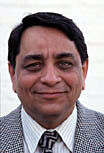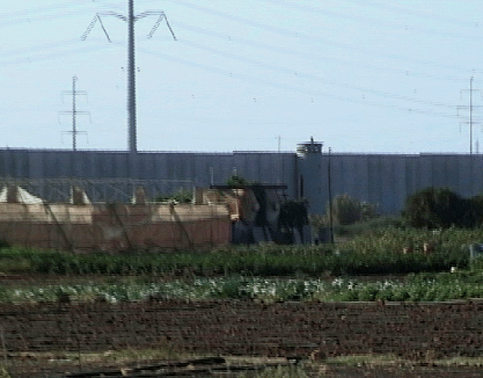Christian Aid 18 June 2003

Christian Aid director Dr Daleep Mukarji.
This massive wall, which practically surrounds this once lively city, is about 25 feet high and 12 feet wide and is punctuated by a series of watchtowers. We felt we were in prison - it was very depressing.
Yet we were in Qalqilya only for about two hours to see the work of our partners, and to experience for a short time the kind of thing that ordinary Palestinians in the Occupied Territories have to go through every day at the hands of the Israeli government. We went from Jerusalem with colleagues from the Palestinian Agricultural Relief Committee (PARC) to visit the West Bank.
The journey, which should have been relatively short, took hours as we had to negotiate roadblocks, check points and barriers that are every-day realities for Palestinians.
On the way to Qalqilya, we saw from a vantage point what this new wall of separation was doing to Palestinian villages, communities and their economy. It separated farmers from their lands and their water supplies, closed access roads and destroyed many olive trees.

Israel’s apartheid wall surrounding the Palestinian town of Qalqiliya (Photo: AEF, 2002)
The roads to Qalqilya were blocked - with only one entrance open, controlled by Israeli army. We waited 45 minutes while we were checked. We saw many who were barred from entering, even vehicles with supplies and approval to enter. We were allowed to enter, but our Palestinian colleague from PARC was refused.
Once there we met with a local facilitator in a taxi. As we entered the city. It seemed to be a ghost town - the shops were closed and the streets deserted.
This new wall did not always follow the ‘green line’ - the armistice line created after the 1967 war, which divides Israel and the Occupied Territories. In fact, from maps we were shown and from what we saw, it often entered deep into the Palestinian West Bank seeming to encircle pockets of population dividing them from their lands and from each other. Some villages were now in ‘no-mans land’ - as if the Israeli authority wanted to erase them from the map.
We asked an official from the Israeli Foreign Office if this new wall was an attempt to change the border and the ground realities. He said that it was a security fence that Israel needed to stop Palestinian’s coming into Israel. Yet it stopped Palestinians from freely moving around the West Bank itself.
I found the whole experience very sad. It appeared that huge, open-air prisons were being built, to destabilise and demoralise Palestinian communities. Both Israeli and Palestinian partners spoke of the horrors of this new wall and its very real costs to both communities.
Would it help the peace process? Our impression was probably not. Would it help to provide security to Israelis? We honestly felt that the long-term solution to security for both peoples is peace, healing, reconciliation and a recognition of the rights of each other and that the wall is not the way to achieve this.
As we left Qalqilya, passing the checkpoint again and picking up our colleagues from PARC, we saw people who had been waiting around even longer. They were being denied the right to enter their own area, to see family and friends and to go about their daily lives.
This wall is not the solution. I came away wondering when we would see barriers being broken and true peace brought to this area. This can only happen when there is a viable, sovereign and sustainable Palestinian State recognised by Israel and the world community. Then in partnership with Israel it could put up a border fence that both accepted and recognised both communities’ rights to security, peace and acceptance.
I left with a prayer in my heart - for peace, for justice and for urgent action by all concerned for find a lasting solution to the tragedy of the Middle East.
Dr. Daleep Mukarji is director of Christian Aid, a UK and Ireland based charity that funds projects in some of the world’s poorest countries.
Related Links:

